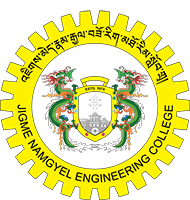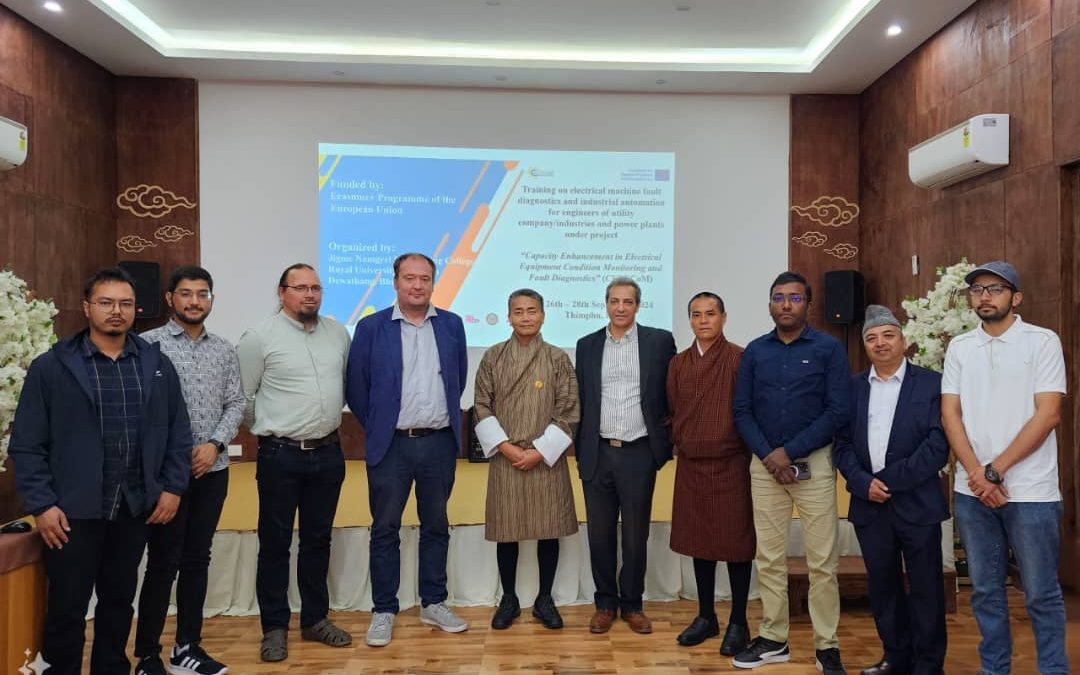The three-day training on “Machine Fault Diagnostics and Industrial Automation” (26-28 September 2024) aimed to provide participants with practical and theoretical knowledge in diagnostics, automation, sensors, and signal processing. Organized under the CEEECoM Project and hosted by Jigme Namgyel Engineering College, the event attracted participants from institutions such as Bhutan Power Corporation, Druk Green Power Corporation and CST. Led by experts from Aalto University (Finland), Tallin University of Technology (Estonia), and Kathmandu University (Nepal), the programme offered both lectures and hands-on sessions for comprehensive learning.
The CEEECoM project, co-funded by the Erasmus+ program under Capacity Building in Higher Education (CBHE), fosters international cooperation through multilateral partnerships in higher education. CBHE aims to enhance the relevance, quality, and modernization of higher education in non-EU countries, supporting socio-economic recovery and growth. Coordinated by Aalto University, the three-year project began in January 2023.
The project aims to tackle the shortage of expert professionals in power system diagnostics, monitoring, and maintenance in Nepal and Bhutan. By introducing innovative teaching and learning methods in higher education, it seeks to bridge the expertise gap and align skills with labor market demands. This initiative will enable both countries to develop local expertise in power equipment condition monitoring, reducing reliance on external consultants.
Day 1: Machine Faults and Diagnostics (26th September 2024)
The first day of the training program at Hotel Mayto, Thimphu, opened with participant registration and a welcome address, followed by an introduction to the CEEECoM project by Prof. Anouar Belahcen from Aalto University. He highlighted the importance of machine fault diagnostics and collaboration between academia and industry.
The morning session, led by Prof. Toomas Vaimann from Tallin University of Technology, covered the fundamentals of diagnostics and condition monitoring, emphasizing the importance of systematic approaches to prevent machine failures. Vaimann used real-world examples to illustrate successful diagnostic techniques. The training continued with a detailed session on typical machine faults, focusing on common issues such as rotor faults, bearing failures, and misalignments.
In the afternoon, Prof. Ants Kallaste TalTech introduced the tools and methods used in condition monitoring, including vibration analyzers and predictive maintenance software. He explained how these tools can enhance operational efficiency and prevent failures.
The day concluded with an interactive “Expertise Game,” where participants diagnosed real-life machine fault scenarios. This hands-on session helped them apply the day’s learning in practical situations. The day ended with a brief recap and preparation for the next day’s focus on sensors and signal processing.
Day 2: Sensors, Instrumentation, and Signal Processing (27th September 2024)
The second day of the training program began with a focus on sensors and instrumentation, led by Prof. Aayush Bista and Prof. Gaurav Dhakal from Kathmandu University. They provided an overview of various sensor types, their calibration, and applications in industrial settings. The session included hands-on exercises, allowing participants to engage with sensor technology and understand its role in monitoring machine conditions.
The hands-on session continued with more exercises, deepening participants’ understanding of sensor use in diagnostics. The trainers emphasized practical applications, ensuring participants could apply these concepts in real-world scenarios.
In the afternoon, Prof. Anouar Belahcen (Aalto University) led a session on signal processing, covering Fourier analysis and its use in analyzing machine signals. Participants were introduced to Jupiter notebooks and Python for signal analysis, providing them with the tools to interpret current and vibration signals effectively.
Prof. Anouar Belahcen and Mr. Dayyan Khan (Aalto University) led a practical session on signal processing, where participants used Jupiter to analyze real-time data. This hands-on exercise allowed them to practice analyzing machine signals, reinforcing the day’s learning. The day concluded with a brief wrap-up, summarizing key takeaways and preparing participants for the final day’s topics. A common dinner and networking session in the evening provided further opportunities for interaction and collaboration.
Day 3: PLC and SCADA
The final day of the session was resourced by the resource persons from Kathmandu University, Nepal in the area of Programmable Logic Controllers and SCADA both theory as well as hands on.

